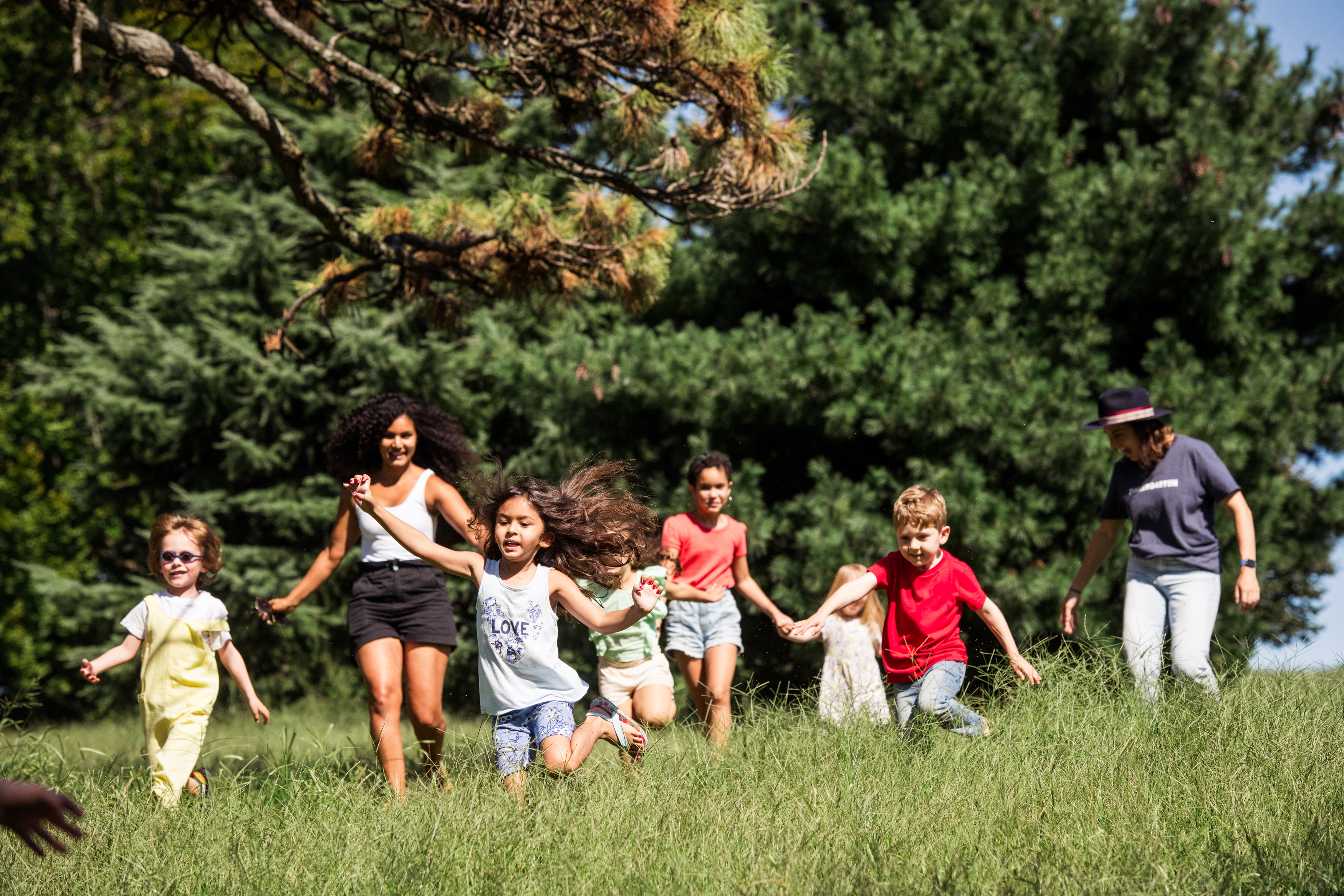“Why did you have to write a blog post about (race, gender, identity, learning differences, native history, Pride Month, Asian American Heritage Month, etc.)? Aren’t you the nature play people?” We have heard that question a bit more frequently in recent years. In parallel, in the world outside of Tinkergarten, I’ve observed patterns of concern and misunderstanding that were not as stark when we started a decade ago.
I hear worries that teaching about all people will conflict with families’ values, introduce topics too early or even “indoctrinate” kids. On the flip side, I see tremendous urgency and pushing on organizations to “do the work”—to actively address inequities in every way they can.
I am so grateful for the conversations I have had with grown ups on both ends of this spectrum and for the chance to slow down in order to hear, share and persevere through fear, difference and uncertainty—to set aside terms that are hard to define, and to talk plainly about what we do at Tinkergarten.
So grateful, that I wanted to express what we believe and what we do so families and teachers could understand what to expect when they “Come to Tinkergarten,” understand why we do it, and know that we are here, human and open to learning together.
What We Do
Though we do not teach kids about the topics of race, gender or other aspects of identity—we are, afterall, the nature play people—we do actively and intentionally work to ensure that all people thrive when they participate in Tinkergarten. In doing so, we aim to help grown ups help their kids become even more curious and capable learners and community-builders who genuinely, actively value themselves and all people.
Why Who We Are Matters
As each of us navigates the world, we balance who we know we are and how the world we live in sees us, and there are times for all of us when we feel truly seen and valued by those around us, and other times when we feel misunderstood, excluded or misrepresented.
The parts of who we are can be bucketed into two types of identity—personal and social. Our “personal identity” consists of our qualities and interests—that which makes us unique. Our “social identity” is the collection of categories assigned to us according to our society’s categories. This includes things like race, heritage, ethnicity, religion, gender, age and ability. Aspects of our social identity give us a sense of belonging but can also assign stereotypes and afford or deny us varying degrees of access or opportunity.
At Tinkergarten, we support learners of multiple generations, and kids can start to learn with us as early as in infancy. We know that the process of forming an identity begins at birth, as humans are wired to glean who they are in the world they'll inhabit from those around them.
All parts of our identity impact our experiences, especially in learning situations. We all need to feel comfortable in our identities in order to learn, and the more seen and valued we feel, the more we thrive. This is why we actively and intentionally work to create an environment in which everyone feels valued for who they are, all identities included. This goes for both local learning spaces like our classes and our broader community spaces like our Outdoors All 4 Facebook Group.
Access By Design
How we each approach learning and the set of strengths we bring and challenges we face impact every learning experience we have. Each learner is unique, special and able to learn and grow in a supportive environment.
From the start, we’ve designed Tinkergarten with a universal design for learning framework that ensures that the class structure as well as the lessons themselves offer many different entry points to allow learners of different ages and learning differences to access the program. From Opening Circle to Guided Play to Gratitude and Goodbye portions of class, we share common rituals, but different explorers approach them in their own way—and all approaches are celebrated!
Our method is play based, learning is child-led, lessons activate multiple senses and modalities, and we focus on process, not any particular product in our lessons. These four principles in concert allow children of a wide age and ability range to find an entry point and take each lesson in the directions that match their interests, strengths and learning needs.
Tinkergarten Teachers offer responsive support and help parents and caregivers guide play in a way that keeps kids in the lead. Teachers also offer modifications that can support kids’ learning differences and needs. For example on our mud play days, we make sure that a range of tools and ways of interacting with mud are available to everyone, ensuring all sensory needs are met.
We also partner with guides—our term for parents and caregivers. They know their explorers best, and by partnering teachers can better understand and support kids' interests and special learning differences.
Resources for Grown Ups
We actively create and share resources like this blog post or our free monthly calendars with the grown ups in our community—our parents, grandparents, caregivers and teachers—to give them ways to help children see, value and explore the beautiful diversity among humans. We deeply believe that children notice differences and the more we can help them to embrace them and see them as a direct parallel to the beautiful diversity in nature, the stronger our communities and world will become.
We also recognize that each family has their own set of beliefs and their own sense of when and how to explore issues of identity with their children. This is why we present these resources to our grown ups and welcome them to decide how best to use them with their children.
How We Support All Identities
As much as possible, we observe, notice and support kids’ individual interests. We encourage teachers to ask grown ups to share special interests that their children have, so teachers can lean in.
We try to support all social identities in a few different ways, both by creating our own shared identities within our Tinkergarten experiences and by celebrating all types of people. In our spaces for grown ups as well as in our classrooms, we do not allow the diminishing of any identity, and we honor the identities expressed by each member of our community.
Our Shared Identities
One way we support all identities is by using language that applies to everyone and reinforces what we share in our Tinkergarten context. For example, when you come to Tinkergarten, you are either an “explorer” (child) or a “guide” (grown up). We chose these words because they describe the special role we each play at Tinkergarten, and they make no assumptions about identity, applying to everyone equally. We no longer ask for a child’s gender when families subscribe, as we wouldn’t plan or prepare for them any differently, and we work hard not to use words like “parents” or “boys and girls” that may actively exclude or add stress to learners in our classes.
How We Provide Mirrors and Windows
We first heard of the mirrors and windows metaphors from the work of esteemed scholar, Rudine Sims Bishop. Children feel a sense of belonging and feel valued for who they are when they see themselves, their families and the groups with which they identify reflected in our program. We think of these as “mirror” moments,
Children also benefit from the chance to experience “windows” into the lives of people not like themselves or like the groups to which they belong. Learning about other cultures, traditions and ways of living helps kids become more curious and less fearful of differences, making them more likely to be inclusive and less likely to regard those different from them as “lesser” or “other.”
Allowing children to learn about a wide range of ways of being in the world needn’t conflict with instilling a strong sense of identity, values and belonging. What a gift it is to help children develop a strong sense of identity as one’s own while also learning to honor the beliefs and traditions of others as their own. Imagine if we could all do that.
There are many ways we try to ensure that we represent all people and offer both mirrors and windows to participants in the program. Some include:
- Each season, as we develop our curriculum of play lessons, members of our Learning team work to identify opportunities to consider all points of view. We search for resources and inspiration that highlight diverse and underrepresented voices, identities and cultures.
- Our program is multi-age and built on a universal design for learning framework, which means we offer many entry points to allow learners of different ages, abilities, strengths and needs to access and learn in the program. We partner with families to better understand and support kids' special learning differences, and lesson plans include suggestions for modifications that can support a wide range of learners.
- Each week, we provide a video read-aloud for parents and caregivers to preview and share with their children. We strive to include children's books written from varied perspectives and including a wide range of characters to help children learn about and value a diverse range of people and creatures. For example, we produced a read aloud of We Are Water Protectors by Carole Lindstrom, then offered this DIY activity to help parents and caregivers help kids learn from the story to children in age-appropriate ways.
- Each month, we develop and share via our free calendar new DIY activities that highlight a range of geographies, histories and heritages. For example, we celebrated Hispanic Heritage Month with activities like Frida’s Flowers and created activities like Spreading Kindness in celebration of Asian American/Pacific Islander Heritage Month. This June, you'll find a new option for weaving Pride Month into your play each week.
- We continue to learn and share ways to help all families include ongoing learning about Indigenous Peoples and their history with the land in our classes, events and activities.
Professional Learning and Collaboration
- With the help of experts, we have developed and will continue to refine training and discussion programs dedicated to how to best support all learners at Tinkergarten for everyone who works at Tinkergarten, Leaders and central teammates alike.
- We will continue to engage in dialog with other experts and organizations and share what we learn through these collaborations with the grown ups in our community through blog posts and our curriculum materials. And, we love to meet new experts, too!
When There Are Financial Barriers
We also recognize that, because Tinkergarten comes at a cost, there are families who cannot join us. Through our Tinkergarten Grant Program, we set aside 3% of all subscriptions to provide grants in the amounts of either 50% or 100% of the cost of a subscription to Tinkergarten to families or teachers who apply. We are pleased to have this in place and look forward to building on this in 2023 and beyond.
We Are Always Learning
This work never ends, and we are always learning at Tinkergarten. Though we want to support every human we can as best we can immediately, too much urgency can undermine the chance for real agency and the kind of learning, listening and understanding that takes time. We remain committed. And, we remain all ears—open to connecting and learning with each other and each family we reach. Like all learning, this process is organic, messy at times and entirely from the heart. Please know we hope you engage and learn with us!

